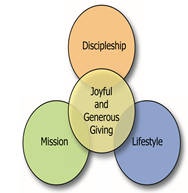 Study 4: Living Generously Study 4: Living Generously
Sermon Date: May 14th, 2017
Readings: Psalm 65; Mark 12: 38-44
Background:
As we continue our consideration of how our faith in the risen Christ must impact our daily living and enable the kingdom of God to grow, we consider financial giving.
Creation, the incarnation, the cross and resurrection and the gift of the Holy Spirit reveal the astonishing love and generosity of God to humanity. In the person and life of Jesus Christ, we see how the love and generosity of God is translated into human behaviour. The challenge for us, as disciples of Jesus, is to willingly surrender and align the way that we choose to live so that through our lives today we release rather than obstruct the flow of God’s generosity. Doing so creates God’s new community– the church, which is the means through which His kingdom grows. This new community abides in and shares the love of God and redefines abundant living (John 10:10) from being the accumulation of consumerism to the fulfilment found in Christ centred lives.
A thread that runs throughout scripture is our response to money, wealth and possessions (e.g. there are over 2,300 verses in the Bible on these three things!). Jesus talked regularly about our response to money, wealth and possessions. For example, 1 in 3 of his parables are on these subjects. So it is important that we both understand and honour Jesus’ teaching on financial giving.

Joyful and generous giving are part of our response to God’s astonishing love in Jesus. They are integral components of our worship.
Joyful and generous giving provide the resources to enable the mission and ministry of the Lord’s church in Ashtead to continue and grow. We all have a part to play.
Joyful and generous giving foster distinctive Christian lifestyles that enable others to be touched by the generosity of God and so build His kingdom.
Following on from teaching on 14th May, this study prepares the way for the “Joyful Giving” booklet and response form that will be distributed next Sunday, 21st. Every member of the church is being invited to prayerfully consider their regular financial giving to the Lord’s ministry through St. Giles and St. George’s and make a response so that we may realise the Lord’s plans together.
Conversation Starter:
Recall an occasion when you have been blessed by someone?
How was this helpful to you and why? And how did you feel?
Questions: (see “Helpful Hints” at the end of this section)
1. Read Psalm 65. Why is the Psalmist praising God?
Questions 2- 5 are based on Mark 12:38-44.
It’s helpful to set the scene:
First century Roman and Jewish society were concerned with status, wealth and honour so there was hierarchical structure and culture. Jewish people worshipped God by observing the law and worshipping in the temple in Jerusalem. The priests administered the religious law and ran the temple. They enjoyed a high status in the community, were known to ‘live well’ and wore distinctive and expensive robes which bore testimony to their collusion to the materialistic values of their society. As part of their worship, the people of God were required to pay temple taxes as well as to make freewill offerings and buy ‘pure’ animals (at exorbitant prices) for sacrifice.
There was no state aid for a widow. Given the very low status of women in biblical times, to be a widow was a desperate predicament. This was why, along with orphans, the law required the religious leaders to honour a duty of care for widows (see Jeremiah 7:6; Ezekiel 22:7; Malachi 3:5; Zechariah 7:10). Yet in verse 40, we read that the teachers of the law seized the property of widows when they were unable to pay their temple taxes!
Jesus is in the temple – teaching. He sits down and watches worshippers bringing their financial gifts to the temple treasury. Giving financially is part of our worship of our awesome God whom the Psalmist extols in Psalm 65. Gifts were received in 13 large trumpet shaped receptacles. The larger the gift, the heavier and more numerous the coins, then the larger the sound that was amplified out through the trumpet shaped receptacles.
2. (verse 39) Why do you think that “many rich people threw in large amounts”?
3. (verse 42) It is significant that Jesus notices the widow. Why do you think the widow is described as “a poor widow”?
4. (verse 42) How does the poor widow make her gift? Why is this significant?
5. (verses 43-44) Mark tells us that Jesus “calls his disciples to him”. This demonstrates the importance of the teaching that Jesus will now give through the witness of the widow.
What principles does Jesus want us to understand and then apply in our financial giving to the Lord’s work?
Action:
In preparation for receiving the invitation to prayerfully review our regular financial giving to enable the Lord’s ministry through the parish church next week, take time to reflect on God’s amazing grace and generosity and give thanks in prayer.
Give thanks to God for the ministry of the church in Ashtead. Please pray for His provision and guidance as we seek to fulfil His plans as shared at the annual church meeting and in the “Joyful Giving” booklet that will be distributed from next Sunday
Helpful Hints for discussion questions:
Question
2 The rich people threw their coins in because they wanted others to hear the sound that their large gift made as the coins landed in the large trumpet shaped receptacle.
High value coins were much larger and heavier than smaller and lighter low value coins that were worth little.
3 In noticing the individual and lowly widow, Mark wants us to remember that Jesus notices everyone and knows the condition of our heart.
She is described as the “poor widow” to emphasise that she was really, really poor in material terms – perhaps destitute.
4 Unlike the many rich people who “threw” in their large coins to draw attention to themselves, the poor widow “put in” her gift. The inference is that the woman willingly, lovingly and carefully gave her gift to honour God with reverence. Her heart was truly in her gift.
5 The poor widow gave willingly, joyfully, quietly and generously (e.g. she gave both her coins). Although it is not revealed in the text, given the law and custom of the time, the poor widow would have been giving regularly in the temple. Giving is to be planned but not prescriptive and allow for spontaneous generosity (e.g. 2 Cor. 9:7).
Financial giving is an integral part of our worship (e.g. 1 Chronicles 29:10-14) and it is for everyone.
Although in monetary value her gift was tiny, the poor widow gave more than everyone else. The wealthy givers gave from their surplus, retaining enough to live and probably live well. In contrast, the poor widow’s gift had a sacrificial quality – coming not from her surplus but from all that she had, what she needed to live on. This is an affirmation of the biblical principle of proportional giving. This is affirmed by Paul in 1 Corinthians 16:1-2 where disciples are called to give in proportion to what they have received (see also Deut. 16:17; 2 Cor. 8:12).
The gift also revealed her faith in God that she would have enough to live on after giving to God first. Giving to God is to be a priority (see Deut. 26:2-3; 1 Cor. 16:2; 2 Cor. 8:5)
Her gift also invites us to embrace sacrificial generosity. Our giving should be something that we notice (not others) and something that costs us. But we give willingly and joyfully as part of our worship and in order to enable His kingdom to come through his church (see 2 Cor. 9: 6-7).
Finally, generous giving is given in community – both for the needs of others and given with others for a common purpose (e.g. Acts 2:42-47; 2 Cor. 8:13-14). The act of giving shifts our focus from individual wants to honouring God and enabling us to partner together in mission and ministry through the church so that the kingdom of God may deepen and extend.
|